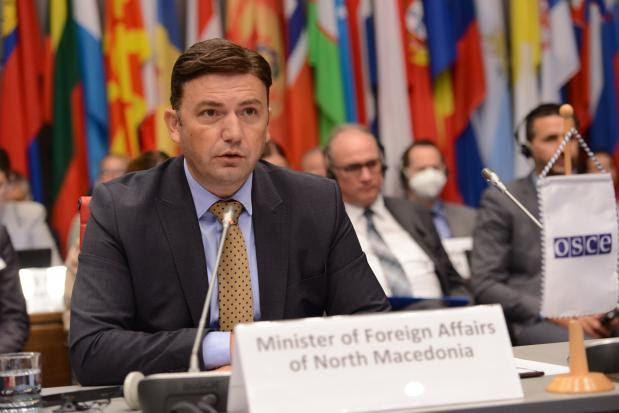In times when the OSCE is seriously tested, it is essential to rebuild mutual trust and confidence, and to demonstrate the political will to re-engage in dialogue on widely shared security concerns, said North Macedonia’s Minister of Foreign Affairs Bujar Osmani today.
As he presented North Macedonia’s priorities as the incoming 2023 OSCE Chairman-in-Office to the Permanent Council, Osmani spoke about Russia’s war against Ukraine, stating that “this war erodes the foundations of the OSCE. It runs counter to the principles we have agreed upon and hold dear. It is a far cry from our milestones and the guiding principles governing relations between participating States.”
He underscored that North Macedonia’s Chairmanship will be working closely with OSCE Secretary General Helga Maria Schmid, OSCE structures and the participating States to safeguard the fundamental principles that lie at the heart of the Organization.
Minister Osmani emphasized that the Chairmanship will focus on the OSCE’s mandate by continuing to make a difference on the ground, implementing the commitments made by all participating States, and rebuilding stability by restoring dialogue.
In the political-military dimension of security, conflict prevention and management will remain a high priority. Protracted conflicts, their related by-products and incremental progress towards peace will top the incoming Chairmanship’s agenda.
“Ukraine will remain our highest priority. However, let us not forget that there are tensions across the OSCE region that are also of great concern. It is important to build upon the existing formats and to provide support for our presence on the ground and other field operations. The Organization should stay dedicated across the OSCE in search of peace,” said Osmani.
Additionally, he listed border management, hybrid and cyber threats, and Women, Peace and Security agenda as first dimension priorities.
In the economic and environmental dimension of security, the Chairmanship will focus on raising further awareness about the nexus between climate change and security. Energy and food security will also be of special importance as both a consequence of the war and potential triggers for conflicts.
“Connectivity and people-to-people contacts have proven beneficial as part of the confidence-building measures. We will build on this. Our focus in 2023 will be also on combating corruption and promoting good governance,” said Minister Osmani.
Underscoring the significance of upholding of human rights, he stated that the human dimension is essential for to the OSCE’s comprehensive approach to security.
“North Macedonia will initiate a broad debate on the necessity of increased engagement related to the respect of fundamental human rights in the light of the today’s complexities, such as the COVID-19 pandemic, wars and conflicts,” said Osmani.
Suggesting that many issues on the OSCE’s agenda are crosscutting, Minister Osmani also highlighted migration and trafficking in human beings as priority targets.
Finally, Minister Osmani underscored the notion of shared responsibility: “We all share the burden of responsibility. We have the tools, we have the knowledge and we have history as our teacher, we should deliver a better future for our people.”
Secretary General Helga Maria Schmid welcomed Foreign Minister Osmani’s comprehensive presentation of the incoming Chair’s priorities, and pledged her full support to North Macedonia’s Chairmanship.
“I welcome the breadth of North Macedonia’s priorities for 2023 – rightly balanced across our three dimensions – and addressing many of the most pertinent contemporary challenges. My team and those of all other OSCE executive structures will stand behind you in delivering on them,” Secretary General Schmid said in her response to Foreign Minister Osmani at the Permanent Council.
“The work awaiting North Macedonia is not easy and its scale and range – enormous. We are all aware that the Russian Federation’s aggression against Ukraine is not only the biggest threat for the European Security from the end of the II World War, but also a serious challenge to the OSCE itself,” Ambassador Adam Hałaciński, Permanent Representative of Poland to the OSCE, Chairperson of the OSCE Permanent Council, said in his response to Foreign Minister Osmani.

